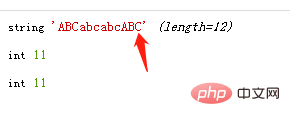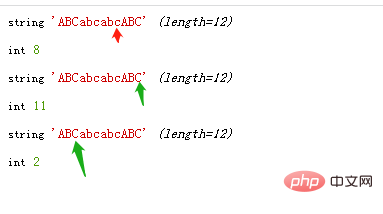How to query the last occurrence of a string in php
Two methods to query the last occurrence position: 1. Use the strripos() function query, which can calculate and return the last occurrence position of the specified string in the target string in a case-insensitive manner. The syntax is " strripos (string being searched, string to be found, position to start searching)". 2. Use the strrpos() function to query, which can perform case-sensitive calculations and return the position of the last occurrence. The syntax is "strrpos (string being searched, string to be found, position to start searching)".

The operating environment of this tutorial: windows7 system, PHP version 8.1, DELL G3 computer
How to query the last occurrence of a string in php ? PHP has two built-in functions to achieve this function:
strripos(): Find the last occurrence of a string in another string (case insensitive).
strrpos(): Find the last occurrence of a string in another string (case sensitive).
1. Case-insensitive query using strripos() function
strripos() is used to calculate the position of the specified string in the target string The position of the last occurrence in (not case sensitive).
The syntax is as follows:
int strripos ( string $haystack , string $needle [, int $offset = 0 ] )
The parameter description is as follows:
haystack: Search in this string.
needle: needle can be a single character or multi-character string. If needle is not a string, it is converted to an integer and treated as a character-order value.
offset: The optional offset parameter allows you to specify which character in the haystack to start searching from. The returned position numeric value is still relative to the starting position of the haystack.
A negative offset will cause the search to start from the beginning of the string and end at the offset position.
Returns the position where the needle exists (independent of the offset) of the last occurrence of the haystack string. Also note that the string position starts at 0, not 1. If needle is not found, false will be returned.
Implementation example:
<?php header('content-type:text/html;charset=utf-8'); $findme = 'c'; $findme1 = 'C'; $mystring = 'ABCabcabcABC'; $pos1 = strripos($mystring, $findme); $pos2 = strripos($mystring, $findme1); var_dump($mystring); var_dump($pos1); var_dump($pos2); ?>

2. Case-sensitive query using strrpos() function
strrpos () is used to calculate the position of the last occurrence of the specified string in the target string.
The syntax is as follows:
int strrpos ( string $haystack , string $needle [, int $offset = 0 ] )
The parameters of the strrpos() function and strripos( ) is similar and can be referred to.
If the offset is a negative number, it will cause the search to end at the count position starting from the end of the string.
Implementation code:
<?php header('content-type:text/html;charset=utf-8'); $findme = 'c'; $findme1 = 'C'; $mystring = 'ABCabcabcABC'; $pos1 = strrpos($mystring, $findme); $pos2 = strrpos($mystring, $findme1); $pos3 = strrpos($mystring, $findme1,-5); var_dump($mystring); var_dump($pos1); var_dump($mystring); var_dump($pos2); var_dump($mystring); var_dump($pos3); ?>

Recommended learning: "PHP Video Tutorial"
The above is the detailed content of How to query the last occurrence of a string in php. For more information, please follow other related articles on the PHP Chinese website!

Hot AI Tools

Undresser.AI Undress
AI-powered app for creating realistic nude photos

AI Clothes Remover
Online AI tool for removing clothes from photos.

Undress AI Tool
Undress images for free

Clothoff.io
AI clothes remover

AI Hentai Generator
Generate AI Hentai for free.

Hot Article

Hot Tools

Notepad++7.3.1
Easy-to-use and free code editor

SublimeText3 Chinese version
Chinese version, very easy to use

Zend Studio 13.0.1
Powerful PHP integrated development environment

Dreamweaver CS6
Visual web development tools

SublimeText3 Mac version
God-level code editing software (SublimeText3)

Hot Topics
 CakePHP Project Configuration
Sep 10, 2024 pm 05:25 PM
CakePHP Project Configuration
Sep 10, 2024 pm 05:25 PM
In this chapter, we will understand the Environment Variables, General Configuration, Database Configuration and Email Configuration in CakePHP.
 PHP 8.4 Installation and Upgrade guide for Ubuntu and Debian
Dec 24, 2024 pm 04:42 PM
PHP 8.4 Installation and Upgrade guide for Ubuntu and Debian
Dec 24, 2024 pm 04:42 PM
PHP 8.4 brings several new features, security improvements, and performance improvements with healthy amounts of feature deprecations and removals. This guide explains how to install PHP 8.4 or upgrade to PHP 8.4 on Ubuntu, Debian, or their derivati
 CakePHP Date and Time
Sep 10, 2024 pm 05:27 PM
CakePHP Date and Time
Sep 10, 2024 pm 05:27 PM
To work with date and time in cakephp4, we are going to make use of the available FrozenTime class.
 CakePHP File upload
Sep 10, 2024 pm 05:27 PM
CakePHP File upload
Sep 10, 2024 pm 05:27 PM
To work on file upload we are going to use the form helper. Here, is an example for file upload.
 CakePHP Routing
Sep 10, 2024 pm 05:25 PM
CakePHP Routing
Sep 10, 2024 pm 05:25 PM
In this chapter, we are going to learn the following topics related to routing ?
 Discuss CakePHP
Sep 10, 2024 pm 05:28 PM
Discuss CakePHP
Sep 10, 2024 pm 05:28 PM
CakePHP is an open-source framework for PHP. It is intended to make developing, deploying and maintaining applications much easier. CakePHP is based on a MVC-like architecture that is both powerful and easy to grasp. Models, Views, and Controllers gu
 CakePHP Creating Validators
Sep 10, 2024 pm 05:26 PM
CakePHP Creating Validators
Sep 10, 2024 pm 05:26 PM
Validator can be created by adding the following two lines in the controller.
 How To Set Up Visual Studio Code (VS Code) for PHP Development
Dec 20, 2024 am 11:31 AM
How To Set Up Visual Studio Code (VS Code) for PHP Development
Dec 20, 2024 am 11:31 AM
Visual Studio Code, also known as VS Code, is a free source code editor — or integrated development environment (IDE) — available for all major operating systems. With a large collection of extensions for many programming languages, VS Code can be c






